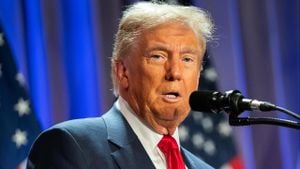When President-elect Donald Trump announced plans to impose hefty tariffs on imports from Mexico and Canada, the air filled with tension, and reactions came swiftly. His propositions aimed for a whopping 25% tariff on goods from these North American neighbors, raising concerns of Economic reprisals and potential job losses. Mexico's leaders have responded with alarming predictions, stressing the interconnectedness of economies and warning of dire consequences if those tariffs are enacted.
Mexican President Claudia Sheinbaum took center stage, calling the proposed tariffs "unacceptable" and declaring Mexico would retaliate should Trump move forward with his plans. Sheinbaum stated, “If there are U.S. tariffs, Mexico would also raise tariffs,” illustrating the seriousness of the threat. This reaction was not just idle talk; the stakes were high, as they were projected to cost upwards of 400,000 jobs within the U.S.—an alarming number for any politician, especially one gearing up for the 2024 elections.
The proposed tariffs were heavily criticized by various economic experts, who cautioned against the potential fallout. Economy Minister Marcelo Ebrard spoke out, warning the tariffs could lead to increased prices for American consumers. For example, he noted, “Most pickup trucks sold in the U.S. are manufactured in Mexico.” The concern here is not just for political posturing but actual financial impacts—he suggested consumers might see steep price hikes of around $3,000 on these vehicles, stretched across the car market.
This situation heated up quickly, especially as Trump's rhetoric seemed to set the stage for what analysts termed “a potential regional trade war.” Trump's stance on tariffs was rooted less in traditional fiscal policy and more as leverage to demand cooperation concerning migration and drug trafficking, issues he has frequently cited throughout his political careerl. During his campaign rhetoric, he pointed to these issues as grounds for imposing economic sanctions, leading to hesitation from both Mexico and Canada, who have quickly reminded Trump of their long-standing economic ties.
The discussions didn’t just stop with the importance of manufacturing and the workforce; the tensions extended to political relationships as well. Trudeau openly described his conversations with Trump about these tariff threats. He emphasized the longstanding cooperation between the two nations, adding, “We talked about some of the challenges,” he noted, reassuring efforts toward collaboration.
Despite the looming tariffs, analysts have begun to observe shifts and strains on supply chains even before any laws are enacted. Businesses have started stockpiling goods and investigating alternative supply sources, all indications of the anticipated chaos should Trump go through with his proposed tariffs. This reactive stance showcases the significant ripple effects his policies could cause, leading to rising costs and potential shortages on an international scale.
The appointment of Jamieson Greer as Trump's new trade representative adds another layer to this already complex situation. Greer, who had significant prior involvement with Trump’s administration and the imposition of earlier tariffs, is expected to advocate for policies aimed at significantly reducing the trade deficit and encouraging domestic manufacturing. His approach appears to echo Trump’s past directives, which some view as potentially agitating for wider conflicts rather than resolutions.
Trade experts are cautious, noting how every economic measure must balance between protecting domestic interests and preserving healthy international relations. Trump's threats, they fear, might reflect not merely tactical negotiations to achieve policy goals but risk antagonizing allies who are already invested partners. The confluence of pushing back against Mexico and considering stronger measures against China demonstrates a comprehensive approach by the Trump administration, but one fraught with uncertainty.
Meanwhile, Mexico’s President did engage Trump directly to discuss migration issues, where she attempted to mitigate fears concerning southbound migration through relations between the friends. Sheinbaum posted about their "excellent conversation" on social media, which revolved around Mexico's strategy to tackle the migrant situation effectively. This highlights the serious diplomatic stakes at play as both countries navigate the potential for frayed relations amid tariff threats.
Further, historical precedents suggest heavy tariffs might stall negotiations rather than bolster American manufacturing, raising doubts among economists. These tariffs are reminiscent of past tariffs used trigger to negotiate more beneficial agreements, but many feel the same leverage could also harm relationships and hinder trade rather than help. Some analysts, like those at Barclays, have already calculated the impact of Trump's tariffs, estimating they could plunge profits for the major U.S. automakers; General Motors, Ford, and Stellantis could face immense profit losses, effectively wiping out gains expected from vehicle sales.
Trump’s transition team has expressed defiance, with spokesperson Brian Hughes asserting the tariffs would shield U.S. interests from perceived unfair foreign practices, arguing it’s about protecting American jobs. But will the cost to consumers, job losses, and aggravated diplomatic relationships be the price to pay for this protection? Time will tell how the policies implementing these tariffs will manifest and what actual impact they will have on the economy.
The current situation continues to evolve, reflecting broader themes of trade and cooperation as countries navigate economic freedoms and the responsibilities required to secure national interests. Given the interdependency of global trade, the fallout from these tariff threats could resonate far beyond the immediate conversations between Trump and Sheinbaum.
Effectively, the stage is set for what could evolve from diplomatic rhetoric to full-blown economic strategies impacting not just North America, but international markets as well.



